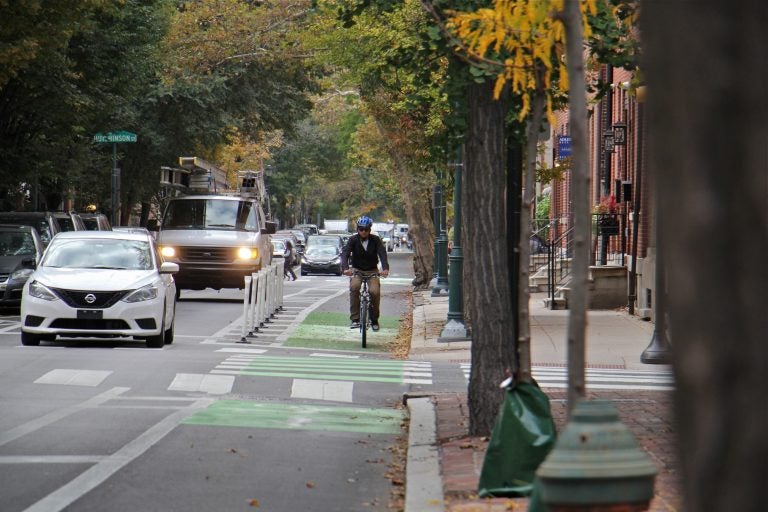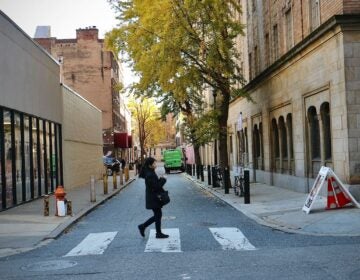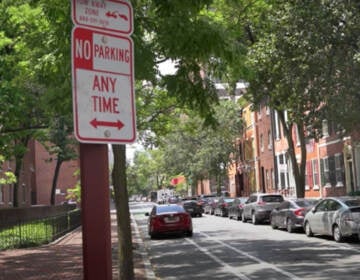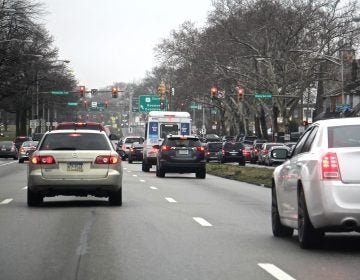The unintended harm of giving civic groups veto power over bike lanes
State Sen. John Sabatina’s amendment to Bill 565 would give RCOs veto power over bike lanes in Philadelphia and make them more vulnerable to lawsuits.

Delineator posts protect a cyclist at Pine and 9th streets. (Emma Lee/WHYY)
Three years ago, Bella Vista Neighbors Association was ready to dissolve. After a lawsuit was brought against the former head of the Association’s predecessor group, BVNA’s insurance company dropped the RCO, and they were then denied by more than 25 other carriers.
Over the next three years, BVNA was only able to survive by utilizing a nontraditional carrier while attempting to get standard insurance back, which they were able to do just this year.
“Once you have a claim, it’s sort of like a bad mark on you. Virtually no one wants to work with you,” said Eugene Desyatnik, president of Bella Vista Neighbors Association. “It’s a surprise it only took us three years. 2020 is the first year we’re back to a normal insurance policy.”
Now, a little-known amendment to a transportation bill in the State Senate could seemingly raise those liability stakes again.
Senate Bill 565, introduced by State Sen. Larry Farnese, is intended to change the motor vehicle code to make it easier for parking-protected bike lanes — wherein the bike lane is placed between parked vehicles and the sidewalk, instead of outside the parking lane — on state roads.
That’s good. Because protected bike lanes have been proven to make streets safer for pedestrians, people on bicycles, and motorists — and with pedestrian deaths up nearly 60 percent in 2020 over 2019, according to a Bicycle Coalition analysis of city data, it’s important transportation agencies have the tools they need to make our roads safe.
But an amendment to SB 565, introduced by State Sen. John Sabatina of Philadelphia, would negate the good intentions of the bill. The amendment would require a meeting with the registered community organization where a bike lane is being proposed, a letter of support from the registered community organization, and a letter from the city councilmember, before the street can be reconstructed.
That may not sound so bad. Communities deserve a voice, after all. But in addition to being redundant and intentionally drawing out the process for installing safer street infrastructure, Sabatina’s amendment could put RCOs out of commission for good.
Today, Philadelphia already meets with RCOs during the bike lane installation process — as is best practice — and any bike lane in Philadelphia that removes a lane of traffic or parking already requires an ordinance from a councilmember.
Before district councilmembers introduce ordinances, the city engages with community and civic organizations to describe the project and solicit feedback. Councilmembers don’t introduce ordinances until those meetings happen and they are assured by the RCOs that there is support.
This has resulted in 18 bike lane ordinances in Philadelphia. Some were introduced without fanfare, some took considerable deliberation. It took 10 years, for instance, before Council President Darryl Clarke introduced an ordinance to add protected bike lanes to JFK and Market Streets in Center City. Outreach by the Office of Transportation, Infrastructure and Sustainability often remains ongoing not only before a project can begin, but well after it is complete.
So not only would requiring a letter, by law, slow down the already slow process, but the amendment could create a slippery slope. Imagine a city where legal letters are required for all sorts of safe infrastructure projects and speed controls, like stop signs, speed humps, and crosswalks. And with legal authority over traffic controls comes legal liability.
Writing community organization veto power into the state vehicle code could actually open up RCOs to more litigation than which they currently have to deal. The amendment could destroy many registered community organizations around the city.
Let’s say a bicyclist or pedestrian gets into a crash on a road that was slated for a complete streets project, but was blocked by the RCO. It follows that the RCO could be sued by the injured person for intentionally putting them in danger.
Currently, the councilmember is responsible for these projects, not the RCO. Serious lawsuits are not filed against the RCO when a bicyclist gets into a crash in that neighborhood, and councilmembers are definitively immune from such lawsuits.
RCO leadership may be individually sued, as well, which is what happened to BVNA for their decisions.
“That’s the last thing anybody wants. Nobody wants to go to court,” says Desyatnik, president of BVNA. “I don’t want that kind of power, and I can’t afford that kind of liability. Our role in land use is advisory, and it already spells rejection from carriers. This, to me, sounds virtually uninsurable.”
Having state-sanctioned, legal authority over public space would make it even more difficult, if not impossible, for some RCOs to get insurance. That’s why many RCOs, including Northern Liberties Neighbors Association, Cedar Park Neighbors, The Pennsylvania Association of Community Development Corporations, East Kensington Neighbors, and others, have publicly come out against this amendment.
For whatever reason, Sen. Sabatina is looking to throw the RCO process into flux, creating a system where perhaps only the richest neighborhoods in the city could afford the kind of insurance that covers these new liabilities.
It is one thing to solicit the views of civics, which is what RCOs are actually for, and another to have such solicitation mandated by state law. RCOs were created for notification — not legislative veto power.
“Our role is to provide notification to neighbors of infrastructure projects and to help facilitate residents’ feedback to the city and developer,” wrote the president of the Northern Liberties Neighbors Association to Sen. Sabatina on October 5th. “We have worked with the Office of Transportation, Infrastructure, and Sustainability (oTIS) to ensure our neighbors have a chance to give their input on bike lanes in our neighborhood, and we follow up with oTIS to hold them accountable for integrating that feedback into a final design. This is the best way for us to have a voice in these types of projects.”
Randy LoBasso is the policy director at the Bicycle Coalition of Greater Philadelphia.

Subscribe to PlanPhilly
WHYY is your source for fact-based, in-depth journalism and information. As a nonprofit organization, we rely on financial support from readers like you. Please give today.







